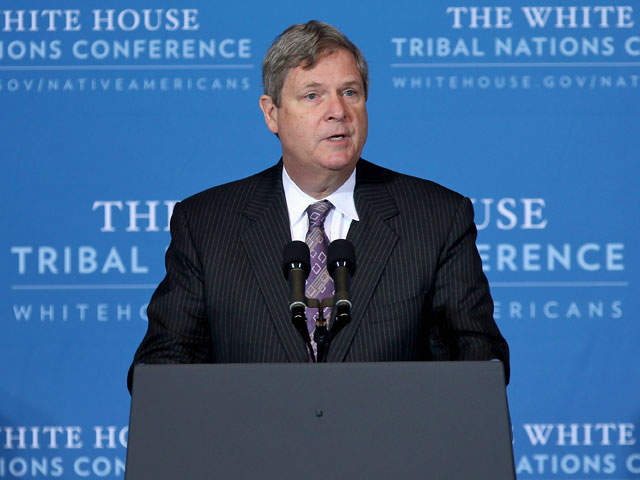
Agricultural News
Oklahoma Tribes to Receive Portion of New Funding for Tribal Community Development From USDA
Mon, 26 Sep 2016 15:05:34 CDT
 At the 8th Tribal Nations Conference hosted today by President Barack Obama in Washington, Agriculture Secretary Tom Vilsack underscored the Administration's support for tribal communities with $9 million in new funds to support community development and education. Since 2009, under Vilsack, the U.S. Department of Agriculture (USDA) has invested more than $3 billion in economic development efforts for Native Americans.
At the 8th Tribal Nations Conference hosted today by President Barack Obama in Washington, Agriculture Secretary Tom Vilsack underscored the Administration's support for tribal communities with $9 million in new funds to support community development and education. Since 2009, under Vilsack, the U.S. Department of Agriculture (USDA) has invested more than $3 billion in economic development efforts for Native Americans.
"Since day one of this Administration, USDA has been committed to a Department that works side by side with Tribal governments and individual American Indians and Alaska Natives," said Vilsack. "We have expanded investment in Native and Tribal community businesses, education, food security, housing, health care and infrastructure. Today's announcement continues our efforts to promote economic development and job creation in Tribal communities for years to come."
Earlier today, President Obama kicked off the 2016 White House Tribal Nations Conference at the Andrew W. Mellon Auditorium in Washington. This event provides tribal leaders from the 567 federally recognized tribes with the opportunity to interact directly with high-level federal government officials and members of the White House Council on Native American Affairs. Each federally recognized tribe is invited to send one representative to the conference. This year's conference builds upon the President's commitment to strengthen the government-to-government relationship with Indian Country and to improve the lives of American Indians and Alaska Natives.
At the event, Vilsack made three significant funding announcements, one of which affects Oklahoma directly.
• $2.3 million in grants to 13 tribal organizations for agricultural and conservation training, outreach and technical assistance in 15 states, including Oklahoma. The grants are part of USDA's Outreach and Assistance for Socially Disadvantaged and Veteran Farmers and Ranchers Program, known as the 2501 Program. The grantees will leverage USDA funds along with partner funding, and serve tribal groups in Oklahoma, Alaska, Arizona, Colorado, Hawaii, Idaho, Michigan, Minnesota, Montana, New Mexico, Oregon, South Dakota, Utah, Washington, and Wisconsin.
• $3.8 million in grants for 28 projects that will help Tribal communities and businesses in 15 states. USDA is providing the funding through the Rural Business Development Grant (RBDG) program. The grants can be used for technical assistance, training and other activities to help develop or expand small and emerging businesses in rural areas.
• $2.9 million in grants to help 20 Tribal colleges make equipment, infrastructure, facilities and educational improvements. The grants will be provided through USDA's Tribal College Initiative Grant program, which supports tribal land grant colleges and universities. The program is an important source of funding for higher education in Native American communities. In 2011 and 2013, USDA Rural Development awarded Nebraska Indian Community College two grants totaling $280,000 to build a classroom and training facility for construction and vehicle maintenance. The new, 4,000-square-foot facility is large enough to provide hands-on training.
In conjunction with the funding announcements, U.S. government partners, including USDA, signed a memorandum of understanding (MOU) affirming the U.S. government's commitment to protect tribal treaty rights and similar rights relating to natural resources through enhanced interagency coordination and collaboration. Additionally, another agreement was signed to extend an earlier MOU regarding Native American sacred sites.
Finally, in support of today's gathering of Tribal leaders in Washington, the USDA Forest Service published a new final rule in the Federal Register ensuring that federally recognized Indian tribes have access to forest products for traditional and cultural purposes. For more information on this rule, please see the Federal Register notice.
USDA has significantly expanded its support for Tribes and tribal communities since 2009, providing $3.1 billion in Rural Development programs and services, including $553 million to build or upgrade more than 300 tribal facilities and $55 million to support Native-owned businesses and economic development. To better coordinate and target USDA support for challenged areas, USDA launched the StrikeForce for Rural Growth and Opportunity initiative in 2010. Today, StrikeForce has invested more than $23.5 billion in 970 persistently-poor counties, parishes, boroughs, census and Tribal areas across the nation. In support of education, USDA supports scholarships for students to attend Tribal Land-Grant Colleges and Universities, and provides additional funding to support research and extension in American Indian communities. For more information on Federal housing support programs in Indian country go to: www.usda.gov/otr.
Secretary Vilsack has made it a priority to build a new era for civil rights at USDA and ensure that all customers and employees are treated fairly, and all Americans are treated with dignity and respect. Under Vilsack's leadership, USDA announced the historic Keepseagle settlement agreement with Native American farmers who have faced discrimination by USDA in past decades. USDA established the Office of Advocacy and Outreach in 2010 to improve access to USDA programs and enhance the viability and profitability of small, beginning, and socially disadvantaged farmers and ranchers. And to improve relations with Native American tribes, USDA named the first Senior Advisor on Tribal Relations in 2012. For an interactive look at USDA's work to improve our Civil Rights record, visit the USDA Results project on Medium.com and read Chapter Eight: The People's Department: A New Era for Civil Rights at USDA.
Source - USDA
WebReadyTM Powered by WireReady® NSI
Top Agricultural News
More Headlines...



















